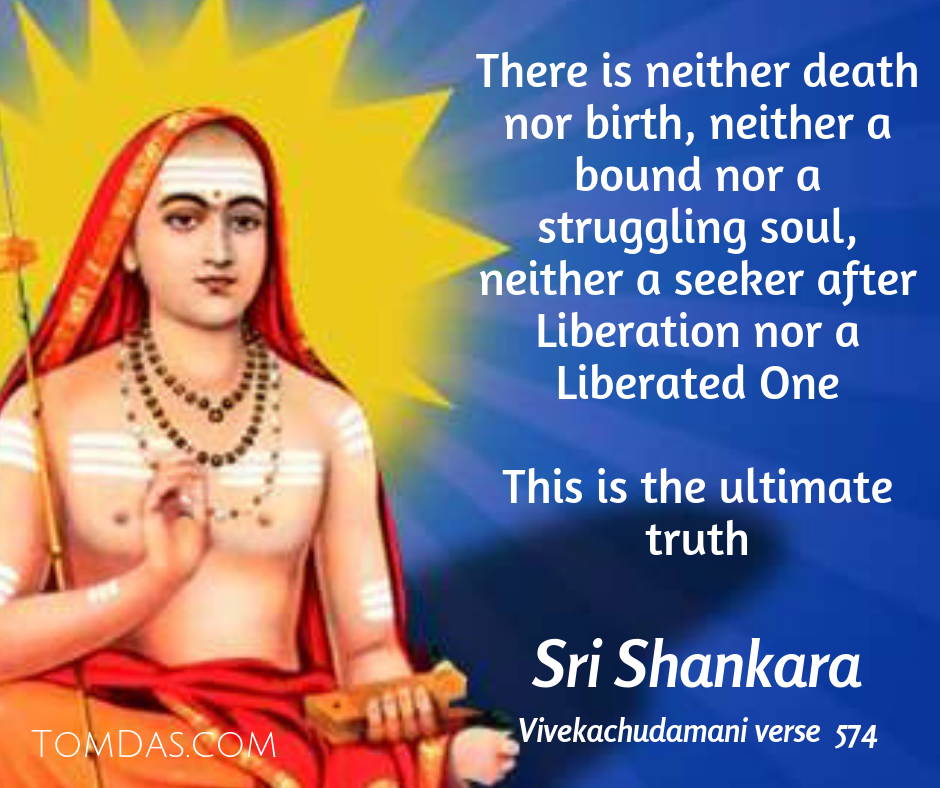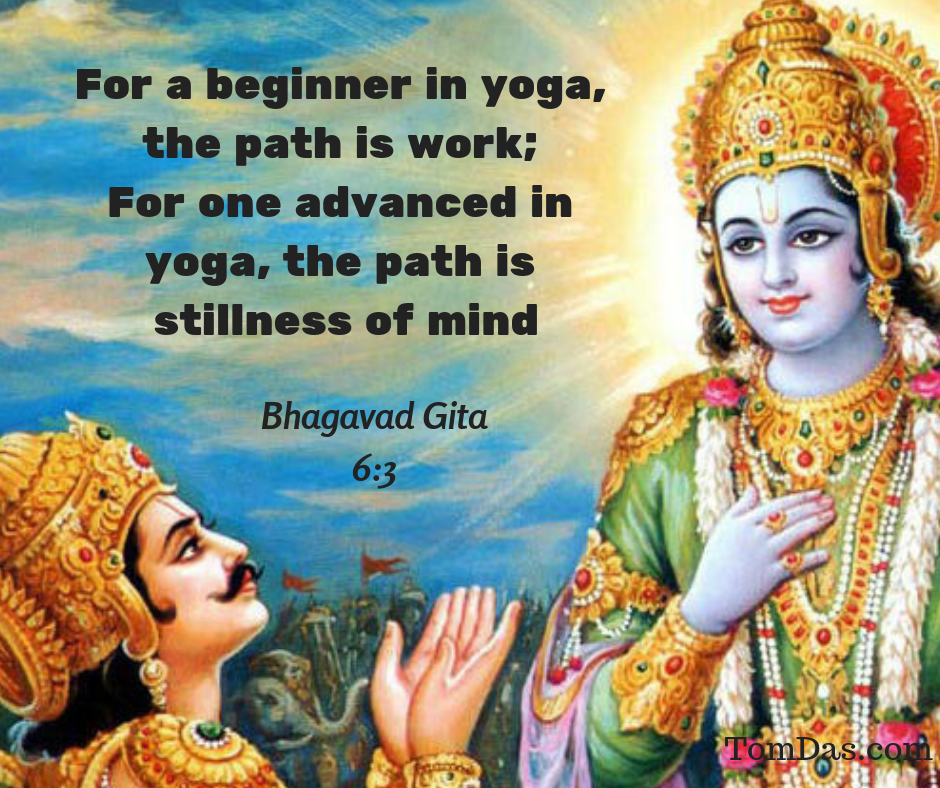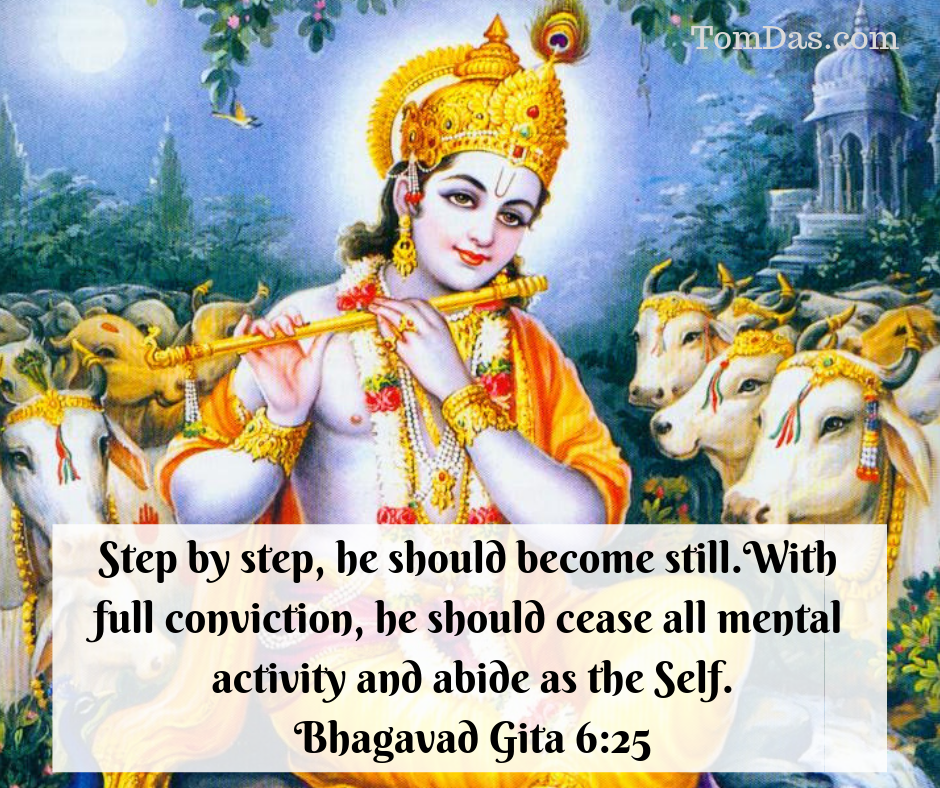I have heard some Advaita Vedanta teachers say that there is no need for faith in Vedanta. However, what do the Advaita scriptures say? Is faith simply blind belief? Is faith based on logic and conceptual knowledge? Or is faith something else?
Here we shall look at some selected quotes from Shankara and the Bhagavad Gita below which state both the importance and necessity of faith on the Path to Liberation, and explore why this is the case.
WHY IS FAITH IMPORTANT?
Why is faith important? Simply put, because without sufficient faith one will not have the dedication, love and perseverance to continue with self-enquiry (vichara), until liberation is attained. And Self-Enquiry, as taught by the Upanishads, by Shankara and by Sri Ramana Maharshi, is the only practice that ultimately leads to Moksha.
SOME TEACHERS SAY FAITH IS NOT REQUIRED
There are some teachers that say faith is not required for Vedanta as one can discover this all for oneself like a scientist can discover the various laws of nature.
Whilst this truth needs to be discovered for oneself and realised for oneself, I have noticed these teachings that push out the need for faith tend to be the teachings that predominately stay on the level of the mind. They tend to teach that prolonged meditation on the Self/Self-Enquiry is not required for liberation, and that essentially one can come to liberation through qualities such as having a keen intellect combined with exploring the nature of our present experience only.
This being the case, these teachings alone do not lead to the end of individuality, duality and suffering – ie. they do not actually lead to Moksha (liberation) at all, and the ego-separation remains.
‘FAITH PENDING RESULTS’?
Some say that Shraddha, the Sankrit word for faith, does not refer to blind faith or mere belief, but to a ‘faith pending results’, similar to the ‘faith’ required for a science student to follow a scientific experiment in order to discover the truth it yields.
Whilst there is some truth in this, it is not the whole truth, and also note that the scriptures do not define faith in this way (see the quotes section below). It is true that faith, as spoken of in the Advaita scriptures, is not the end goal in itself, meaning one doesn’t simply believe in God or in a dogma or creed of some kind and leave it at that, which would be rather superficial and on the level of the intellect predominantly. Rather faith is a ferry to take us to the shore of liberation, and this liberation is the goal, and this goal of liberation or God must be ‘experienced’ or ‘realised’ or ‘known’ for oneself, for want of a better phrase.
However, the faith spoken of in the Vedanta scriptures is much deeper than what has been described above. It is not just a mere willingness to try something until you see the results, like a scientist, or even a simple trust that the teachings will show you the way, but something that throbs in our very core, a deep conviction, in our very heart, in our Being. It is a deep resonance, a magnetic pull, intertwined with an intuitive knowing.
This faith cannot be taught, but is something that at some point in our journey springs into our very Being and takes us Home to Liberation. Perhaps it comes to us having listened to and studied the Advaita (or similar) teachings for some time, or perhaps faith dawns after having experienced the various ups and downs of life, or perhaps it comes to us unasked for, as Divine a Gift from God, a Gift of His Grace.
This true faith is inextricably linked with Bhakti, or devotional love of the Divine, which culminates in love to be with Self as Self, otherwise known as Self-Enquiry or Dhyana (meditation).
For me this Faith arose through the Presence and Teachings of Sri Ramana Maharshi, and for that I am forever grateful. His Presence and His Teachings unfailingly guide Homeward those who have come under His Spell and Grace. He is the Lord, He is the very Self, he resides within your very Heart – turn inwards and dis-cover (ie. uncover and reveal) your identity with Him.
QUOTES FROM THE VEDANTA SCRIPTURES
Let us see what kind of person, according to Vedanta, attains Jnana, or ‘divine knowledge’, otherwise known as liberation:
Bhagavan Lord Krishna states in the Gita Chapter 4, verse 39: ‘Those whose faith is deep and who have practiced controlling their mind and senses attain divine knowledge.’
But what if this faith is not present?
Lord Krishna also states in the Gita in the next verse, chapter 4, verse 40: ‘But persons who possess neither faith nor knowledge, and who are of a doubting nature, suffer a downfall. For the skeptical souls, there is no happiness either in this world or the next.’
In Chapter 5, Krishna further states in verse 17: ‘Those whose intellect is fixed in God, who are wholly absorbed in God, with firm faith in Him as the supreme goal, such persons quickly reach the state from which there is no return, their sins having been dispelled by the light of knowledge.’
What is the definition of faith?
Shankara defines faith and states it is necessary for realisation in Vivekachudamani: ‘Acceptance by firm judgment as true of what the Scriptures and the Guru instruct, is called by sages Shraddha or faith, by means of which the Reality is perceived‘
Shankara also writes in Aparokshanubhuti that Shraddha is required for liberation and defines Shraddha as follows: ‘Implicit faith in the words of the Vedas and the teachers (who interpret them) is known as Shraddha‘
Lets leave the last quote of this post to Bhagavan Sri Krishna, this time from the last verse of Chapter 6 of the Bhagavad Gita where he states: ‘Of all yogis, those whose minds are always absorbed in me, and who engage in devotion to me with great faith, them I consider to be the highest of all.’



Very good discussion on faith in terms of SELF. REALIZATION BY THE VIEWS OF BOTH JAGADGURUS ADI SHANKARACHARYA AND BHAGWAN SHREE KRISHNA. I REALLY THANKING YOU FOR YOUR DISCUSSION. BHARAT PURUSHOTTAM SARASWATI AUTHOR OF ADI SHANKARACHARYA BRAHMSUTRA SHANKAR BHASHYAM GUJARATI VERSION AN ADVAITA PHILOSOPHY AVAIL ON AMAZON.COM
LikeLiked by 1 person
Excellent work! Thanks Tom 🙏🏽
LikeLiked by 1 person
Thanks Rachel
LikeLike